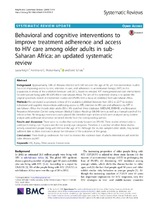| dc.contributor.author | Knight, Lucia | |
| dc.contributor.author | Mukumbang, Ferdinand C. | |
| dc.contributor.author | Schatz, Enid | |
| dc.date.accessioned | 2018-08-23T12:14:26Z | |
| dc.date.available | 2018-08-23T12:14:26Z | |
| dc.date.issued | 2018 | |
| dc.identifier.citation | Knight, L. et al. (2018). Behavioral and cognitive interventions to improve treatment adherence and access to HIV care among older adults in sub- Saharan Africa: an updated systematic review. Systematic Reviews, 7: 114 | en_US |
| dc.identifier.issn | 2046-4053 | |
| dc.identifier.uri | https://doi.org/10.1186/s13643-018-0759-9 | |
| dc.identifier.uri | http://hdl.handle.net/10566/3967 | |
| dc.description.abstract | BACKGROUND: Approximately 14% of Africans infected with HIV are over the age of 50, yet few intervention studies
focus on improving access to care, retention in care, and adherence to antiretroviral therapy (ART) in this
population. A review of the published literature until 2012, found no relevant ART management and care interventions
for older people living with HIV (OPLHIV) in sub-Saharan Africa. The aim of this systematic review is to update the
original systematic review of intervention studies on OPLHIV, with a focus on evidence from sub-Saharan Africa.
METHODS: We conducted a systematic review of the available published literature from 2012 to 2017 to explore
behavioral and cognitive interventions addressing access to ART, retention in HIV care and adherence to ART in
sub-Saharan Africa that include older adults (50+). We searched three databases (MEDLINE, EMBASE, and Education
Resources Information Center) using relevant Medical Subject Headings (MeSH) terms as well as a manual search of the
reference lists. No language restrictions were placed. We identified eight articles which were analyzed using content
analysis with additional information obtained directly from the corresponding authors.
RESULTS AND DISCUSSION: There were no studies that exclusively focused on OPLHIV. Three studies referred only to
participants being over 18 years and did not specify age categories. Therefore, it is unclear whether these studies
actively considered people living with HIV over the age of 50. Although the studies sampled older adults, they lacked
sufficient data to draw conclusions about the relevance of the outcomes of this group.
CONCLUSIONS: These findings underscore the need to increase the evidence-base of which interventions will work for
older Africans on ART. | en_US |
| dc.language.iso | en | en_US |
| dc.publisher | BioMed Central | en_US |
| dc.rights | © The Author(s). 2018 Open Access This article is distributed under the terms of the Creative Commons Attribution 4.0
International License (http://creativecommons.org/licenses/by/4.0/), which permits unrestricted use, distribution, and
reproduction in any medium, provided you give appropriate credit to the original author(s) and the source, provide a link to
the Creative Commons license, and indicate if changes were made. The Creative Commons Public Domain Dedication waiver
(http://creativecommons.org/publicdomain/zero/1.0/) applies to the data made available in this article, unless otherwise stated. | |
| dc.subject | HIV | en_US |
| dc.subject | Aging | en_US |
| dc.subject | Older people | en_US |
| dc.subject | Interventions | en_US |
| dc.title | Behavioral and cognitive interventions to improve treatment adherence and access to HIV care among older adults in sub-Saharan Africa: an updated systematic review | en_US |
| dc.type | Article | en_US |
| dc.privacy.showsubmitter | FALSE | |
| dc.status.ispeerreviewed | TRUE | |

